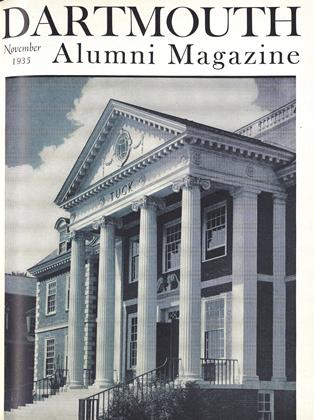Leonard D. White '14. Univ. of Chicago Press.
The experience of the last two years with amateur administrators in vitally important government positions has shown the glaring need of a career civil service. This book, written by a member of the Federal Civil Service Commission, is thus particularly timely.
The author confines himself to discussing a career service including only the 2500 most decisive posts in non-political government service, on the basis that in these posts lies the great danger from inefficient politicians, unselfish but inexperienced college professors, or from lawyers with an eye to using their government connections later against the government itself. He states that though the government has usually been successful in recruiting able technicians when necessary, there is a real need for disinterested and highly trained administrators, with a loyalty to their service and to the government regardless of the party in power. They should be sufficiently well-paid so that a business or professional career will not prove overwhelmingly seductive. Admission to the service should open the career all the way to the top, and the work should be of sufficient importance to call for their best abilities.
He feels that inertia rather than opposition is the principal bar to the successful execution of his plan. Excepting the post of permanent under-secretary to cabinet members, most positions are already in existence and under civil service. The salary scale, from $1,600 to $10,000 is that of present corresponding posts. In the beginning, he would recruit largely from the existing service. Major innovations are the subsequent partial recruiting of collegetrained (but not professionally trained) men, promotion after the probation period without examination, on the basis of fitness, a five-year period of training by shifting from post to post, and the weeding out of those intellectually capable but not possessing the requisite administrative ability.
In some ways Mr. White's ideas extend the methods of recruitment and promotion used in the Department of State's Foreign Service. In others he has adapted the methods of the British and old German civil services to American conditions. He has suggested no untried innovations. His explanation of the problem and his solutions are clearly and succinctly set forth, and should be widely circulated and studied.
 View Full Issue
View Full Issue
More From This Issue
-
 Article
ArticleTHE OUTING CLUB REORGANIZES
November 1935 By Natt W. Emerson '00 -
 Class Notes
Class NotesClass of 1914
November 1935 By Edward Leech -
 Class Notes
Class NotesClass of 1911
November 1935 By Prof. Nathaniel G. Burleigh -
 Article
ArticleHANOVER BROWSING
November 1935 By Herbert F. West '22 -
 Class Notes
Class NotesClass of 1934
November 1935 By Martin J. Dwyer Jr. -
 Class Notes
Class NotesClass of 1908
November 1935 By L. W. Griswold
Harold J. Tobin '17
Books
-
 Books
BooksALUMNI PUBLICATIONS
August 1924 -
 Books
BooksTHE LITERARY ART OF EDWARD GIBBON.
June 1960 By ARTHUR M. WILSON -
 Books
BooksFORESIGHTS IN COLLECTIVE BARGAINING.
January 1947 By C. E. Dankert. -
 Books
BooksFarmers and Workers in American Politics
March 1925 By Erville B. Woods -
 Books
BooksWHERE THE POOLS ARE BRIGHT AND DEEP
November 1973 By JOHN HURD '21 -
 Books
BooksA REFERENCE GUIDE TO THE STUDY OF PUBLIC OPINION.
November 1934 By Paul Allen '26



